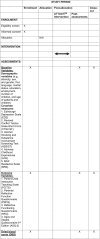Study protocol for Attachment & Child Health (ATTACHTM) program: promoting vulnerable Children's health at scale
- PMID: 35986306
- PMCID: PMC9388995
- DOI: 10.1186/s12887-022-03439-3
Study protocol for Attachment & Child Health (ATTACHTM) program: promoting vulnerable Children's health at scale
Abstract
Background: Children's exposure to toxic stress (e.g., parental depression, violence, poverty) predicts developmental and physical health problems resulting in health care system burden. Supporting parents to develop parenting skills can buffer the effects of toxic stress, leading to healthier outcomes for those children. Parenting interventions that focus on promoting parental reflective function (RF), i.e., parents' capacity for insight into their child's and their own thoughts, feelings, and mental states, may understand help reduce societal health inequities stemming from childhood stress exposures. The Attachment and Child Health (ATTACHTM) program has been implemented and tested in seven rapid-cycling pilot studies (n = 64) and found to significantly improve parents' RF in the domains of attachment, parenting quality, immune function, and children's cognitive and motor development. The purpose of the study is to conduct an effectiveness-implementation hybrid (EIH) Type II study of ATTACHTM to assess its impacts in naturalistic, real-world settings delivered by community agencies rather than researchers under more controlled conditions.
Methods: The study is comprised of a quantitative pre/post-test quasi-experimental evaluation of the ATTACHTM program, and a qualitative examination of implementation feasibility using thematic analysis via Normalization Process Theory (NPT). We will work with 100 families and their children (birth to 36-months-old). Study outcomes include: the Parent Child Interaction Teaching Scale to assess parent-child interaction; the Parental Reflective Function and Reflective Function Questionnaires to assess RF; and the Ages and Stages Questionnaire - 3rd edition to examine child development, all administered pre-, post-, and 3-month-delayed post-assessment. Blood samples will be collected pre- and post- assessment to assess immune biomarkers. Further, we will conduct one-on-one interviews with study participants, health and social service providers, and administrators (total n = 60) from each collaborating agency, using NPT to explore perceptions and experiences of intervention uptake, the fidelity assessment tool and e-learning training as well as the benefits, barriers, and challenges to ATTACHTM implementation.
Discussion: The proposed study will assess effectiveness and implementation to help understand the delivery of ATTACHTM in community agencies.
Trial registration: Name of registry: https://clinicaltrials.gov/.
Registration number: NCT04853888 . Date of registration: April 22, 2021.
Keywords: ATTACHTM; Child development; EIH type 2 clinical trial; Normalization process theory; Parent-child interaction; Parenting program; Quasi-experimental design; Reflective function; Study protocol.
© 2022. The Author(s).
Conflict of interest statement
The authors have no competing interests to report.
Figures
References
-
- Francis L, DePriest K, Wilson M, Gross D. Child poverty, toxic stress, and social determinants of health: screening and care coordination. Online J Issues Nurs. 2018;23(3). https://www.ncbi.nlm.nih.gov/pmc/articles/PMC6699621/. - PMC - PubMed
-
- Center on the Developing Child at Harvard University . The foundations of lifelong health are built in early childhood. Boston: Harvard University; 2010.
Publication types
MeSH terms
Associated data
LinkOut - more resources
Full Text Sources
Medical
Miscellaneous


